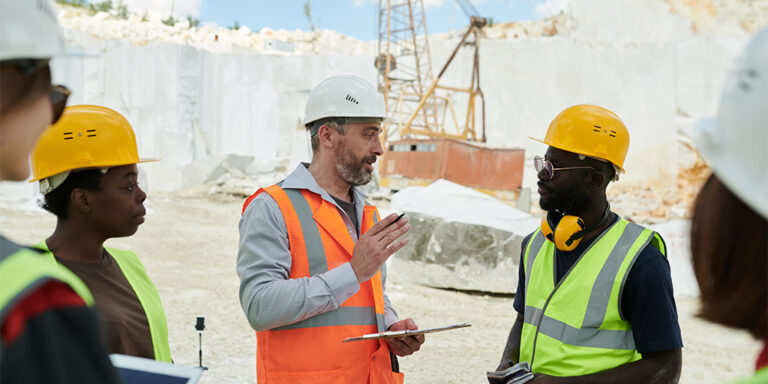— 4 min read
The Role of a Construction Project Manager
Last Updated Apr 1, 2025
Last Updated Apr 1, 2025

The construction project manager plays an important role in a construction project. They plan, organise and schedule all the activities on site. Without them, projects could get chaotic and off track. But it’s not just planning that construction project managers are responsible for. They’re kept busy with all sorts of tasks on site and in the office. We’ll explore those responsibilities throughout this article. Keep reading to learn about the roles and duties of a construction project manager, how the career has evolved and how it’s still changing today.
Table of contents
What is a construction project manager?
A construction project manager is the person that brings order to the busy environment of a construction site. They’re responsible for overseeing projects with three things at the top of their mind:
+ Health and safety
+ Planning schedule
+ Costs
They organise projects so that both the construction process and the finished build are safe and compliant with all health and safety regulations. They also make sure that the project is completed on time and on budget. How much it will cost and how long it will take are two of the most important factors for whether clients are happy with a project, so the construction project manager must focus on keeping them under control. A big part of their role is to make sure there are no major or unexpected changes that affect the budget or the timeline.
Shape the Future of the Built Environment at Procore's Construction Summit
Engage with construction leaders and discover the latest technology and best practices that are driving change across the industry.

Why is construction project management important?
Construction project management is essential for getting work done on time, on budget and safely. The construction project manager ensures that all of these areas are under control. They create the plan for construction projects, carry out vital quality and safety checks on site and monitor all aspects of project progress. They are also responsible for managing materials and workers — a task known as resource allocation — to make sure everyone has what they need. Construction project managers also need to solve problems and challenges when they arise, and manage risks.
A Day in the Life of a Construction Project Manager
Construction project managers split their time between the office and the site, and no two days look the same. Their day typically involves coordinating with architects, engineers, designers and other professionals to ensure that projects meet safety standards and all planned specifications. They also need to respond to situations and challenges throughout the workday. They help find ways for workers to adapt to unexpected changes. Here’s what a day in the life of a construction project manager could look like:
Daily Routine Breakdown
07:00 — Arrive on site and open up with the security team
07:15 — Catch up on emails over breakfast and a cup of tea
07:30 — Prepare for morning site briefing, check who is on site for the day
08:00 — Deliver the morning briefing
08:45 — Carry out site inspections and monitoring
09:30 — Head back to the office to carry out admin work, make phone calls, answer emails
10:00 — Update project schedules and timelines based on the morning inspection and material deliveries
11:30 — Meet with client to update them on project, scope and expectations
12:30 — Lunch
13:30 — Office admin, updating documentation, processing invoices
14:30 — Meet with subcontractors to review progress and discuss any challenges
15:30 — Meet with site supervisors to follow up on any issues from the day
16:00 — Budget and cost review, updating project finance data
17:00 — Review the day and plan priorities for tomorrow’s morning briefing
Construction Manager vs. Construction Project Manager
Although these terms sometimes overlap, there are some subtle differences:
- A Construction Manager typically focuses on supervising workers and handling daily field operations. Their oversight is heavily site-based.
- A Construction Project Manager has a broader scope, handling all aspects of planning, scheduling, budgeting, and stakeholder communication from start to finish.
In many organisations, they perform overlapping duties, but some companies make a clear distinction between these two roles.
Becoming a Construction Project Manager
Construction project management is a competitive career, but it’s a role that offers good job security, development opportunities and competitive pay. It can be a challenge to break into any competitive career, so let’s tackle some frequently asked questions from aspiring construction project managers.
Final Thoughts
The construction project manager plays a vital role by keeping everything organised and moving forward on site. They handle planning, scheduling, managing costs, and ensuring health and safety protocols. By coordinating everyone from subcontractors to architects, they help projects finish smoothly, on time, and within budget.
Categories:
Tags:
Written by
Jordan Moran
Jordan Moran, based in London, is a seasoned expert in construction management. Currently a Solution Engineer at Procore Technologies, he has held roles such as Project Manager at BEH Interiors and Assistant Project Manager at Pick Everard, with foundational experience at Morgan Sindall Construction. He holds a BS in Construction Engineering Management from Loughborough University and certifications including APM PFQ, Procore Project Manager, CITB CSCS Card + SMSTS. Jordan's expertise spans construction processes and project management.
View profileReviewed by
Nicholas Dunbar
27 articles
Nick Dunbar oversees the creation and management of UK and Ireland educational content at Procore. Previously, he worked as a sustainability writer at the Building Research Establishment and served as a sustainability consultant within the built environment sector. Nick holds degrees in industrial sustainability and environmental sciences and lives in Camden, London.
View profileExplore more helpful resources

Leveraging Analytics for Better Financial Forecasting in Construction
Financial forecasting is a difficult task in any industry. In construction, where companies need to manage volatile material costs, labour shortages and variation orders on a daily basis, fluctuations in...

Strategies to Prevent Rework: The Importance of Clear Instructions
In construction, “rework” is the dreaded process of redoing tasks due to mistakes, quality issues, or safety concerns. This unnecessary work drains budgets through wasted materials and labour while causing...

Building a Culture of Quality in Construction: How Safety Approaches Can Transform Quality
The UK construction industry faces persistent quality issues that compromise safety, inflate costs, and erode trust. Despite universal pursuit of excellence, high rates of rework and defects cost billions annually...

Mastering Document Control in Construction Projects
The construction industry generates enormous volumes of paperwork. A single project can produce countless documents, making organisation, accessibility, and security essential. Construction document control systematically manages project-related documents, giving teams...